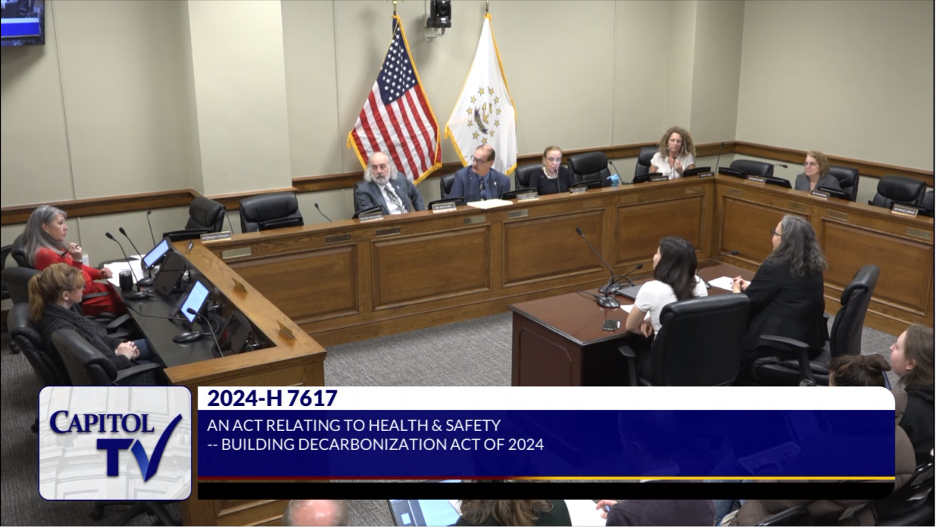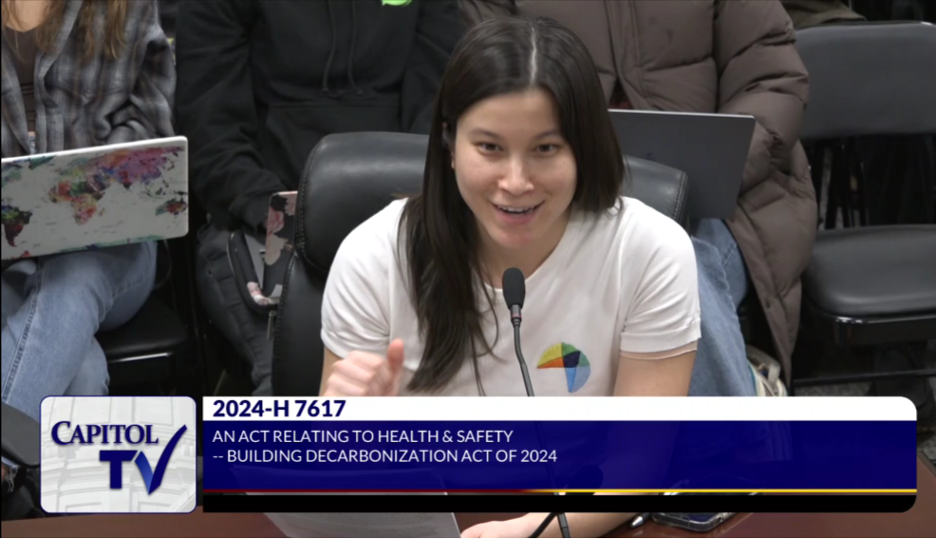Tackling Building Emissions at the Rhode Island Legislature in 2024
The Act on Climate requires statewide emissions reductions of 45% below 1990 levels by 2030, 80% by 2040, and net-zero emissions by 2050. While Rhode Island has seen recent policy wins in the electric and transportation sectors, the state is not on track to meet the mandated targets in the Act on Climate and lacks a plan to reduce emissions from buildings. Buildings in Rhode Island, specifically accounting for residential and commercial heating, are responsible for nearly 30% of our state’s greenhouse gas emissions. To meet the Act on Climate mandates, we must tackle the transition of our building sector away from fossil fuels. This requires meaningful investments in energy efficiency in tandem with the rapid electrification of our heating and other appliances.
That’s why, in Rhode Island, Acadia Center’s top legislative priority is the Building Decarbonization Act of 2024 (H7617/S2952), which will begin to tackle carbon emissions in both existing and new buildings. Acadia Center partnered with Green Energy Consumers Alliance, the Institute for Market Transformation and the U.S. Green Buildings Council, along with legislative sponsors Senator Meghan Kallman and Representative Rebecca Kislak, to develop and advance the content of the act. In 2024, the Building Decarbonization Act merges previous benchmarking and all-electric new construction bills, and incorporates modifications suggested by the Office of Energy Resources (OER) and other stakeholders.
Acadia Center’s advocacy has centered on strengthening relationships and identifying solutions to address housing and electricity affordability, both in the Building Decarbonization Act and more broadly throughout its work.
How does the bill tackle building emissions?
First, the bill proposes benchmarking for large existing buildings, requiring the tracking and reporting of energy usage in large public buildings and then private buildings in two phases. Equipped with a better understanding of their utility bills and energy consumption, building owners can then leverage data to make cost-effective investments that will save them money and reduce their energy usage and thus emissions. Following three years of collecting baseline data, the bill proposes that OER create a building performance standard to guide these large building owners through setting long-term energy reduction and emissions targets. The act targets the largest buildings to gain the greatest impact when it comes to potential for energy and emissions reductions.
Second, the bill proposes multiple tiers of all-electric new construction, from electric-ready requirements to requirements for public buildings, followed by enabling the local approval of all-electric requirements, and ultimately requiring that all new construction statewide be all-electric, with some exceptions for commercial and industrial uses. While only a small proportion of Rhode Island’s building stock is new construction, the act ensures that new buildings take advantage of the most energy efficient technologies, avoid stranded infrastructure ‘lock-ins,’ and lead the way to a fossil fuel free future. For public projects, the bill includes provisions for apprenticeship programs and project labor agreements above a certain threshold.
What is the status of the Building Decarbonization Act?
House Bill No. 7617 was introduced and referred to the House Environment and Natural Resources Committee on 02/15/2024. The House Environment and Natural Resources Committee heard the Building Decarbonization Act on the evening of Thursday, March 21st, alongside the Clean Heat Standard and a wide range of other bills related to resilience, chemical reduction, and other topics. Acadia Center’s Emily Koo introduced the content of the bill alongside the sponsor, Representative Kislak, prior to offering verbal testimony. A wide range of local and national advocacy groups and residents expressed strong support for the Building Decarbonization Act with written and verbal testimony.


In partnership with Green Energy Consumers Alliance, Acadia Center has lobbied members of the House and Senate and garnered support for the Building Decarbonization Act among diverse stakeholders, from housing nonprofits to construction companies. Key goals have been demystifying myths about the bill and discerning the unique benefits and hurdles of benchmarking and building all-electric in Rhode Island.
Senate Bill No. 2952 was introduced and referred to the Senate Environment and Agriculture Committee on April 5th, 2024. The Senate Environment and Agriculture Committee will hear the Building Decarbonization Act on Wednesday, May 1st, beginning at 4:30 PM, alongside the Clean Heat Standard and many other environmental and energy-related bills. The Senate hearing is another important opportunity to demonstrate to legislators the importance of tackling building emissions this session.
How can you help?
If you’re a Rhode Island resident, we encourage you to contact your state representative and state senator to highlight your support for the Building Decarbonization Act of 2024 (H7617/S2952) and the importance of tackling carbon emissions in both existing and new buildings. The Building Decarbonization Act has also emerged as a top priority of the Environment Council of Rhode Island.
Supporters are also strongly encouraged to submit written testimony to the Senate Environment and Agriculture Committee and to attend the hearing in-person on Wednesday, May 1st to show support. The Committee agenda is available here. Written testimony must be submitted prior to 3:00 PM on Wednesday, May 1st to SLegislation@rilegislature.gov. Be sure to include your name, organization (if relevant), and your support for S2952. Green Energy Consumers Alliance offered these helpful resources for the Housing hearing, with templates for written testimony and tips for coming to the State House. Contact Acadia Center’s Rhode Island Program Director, Emily Koo, ekoo@acadiacenter.org, for any questions about showing your support for the Building Decarbonization Act at Wednesday’s Senate Environment hearing or beyond.
Resources
Building Decarbonization Act Summary
Facts and Myths about the Building Decarbonization Act in RI
Acadia Center Testimony in Support of Senate Bill 2952, the Building Decarbonization Act of 2024




















Follow us